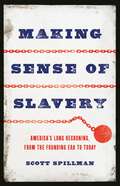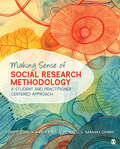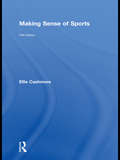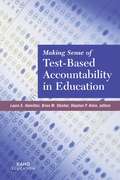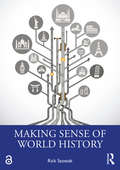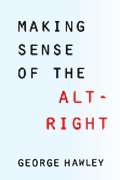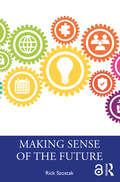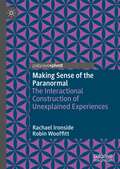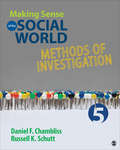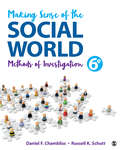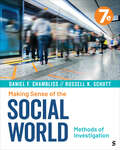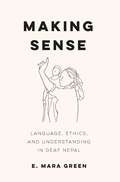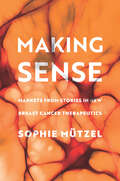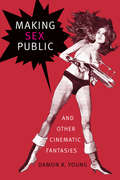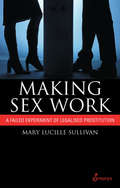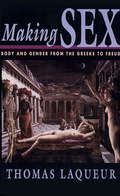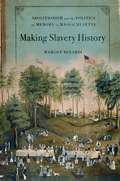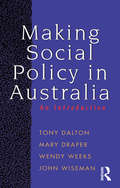- Table View
- List View
Making Sense of Science: Separating Substance from Spain
by Cornelia DeanCornelia Dean draws on her 30 years as a science journalist with the New York Times to expose the flawed reasoning and knowledge gaps that handicap readers when they try to make sense of science. She calls attention to conflicts of interest in research and the price society pays when science journalism declines and funding dries up.
Making Sense of Slavery: America's Long Reckoning, from the Founding Era to Today
by Scott SpillmanAn &“essential&” (James Oakes, author of The Crooked Path to Abolition) history of the study of slavery in America, from the Revolutionary era to the 1619 Project, showing how these intellectual debates have shaped American public life In recent years, from school board meetings to the halls of Congress, Americans have engaged in fierce debates about how slavery and its legacies ought to be taught, researched, and narrated. But since the earliest days of the Republic, political leaders, abolitionists, judges, scholars, and ordinary citizens have all struggled to explain and understand the peculiar institution. In Making Sense of Slavery, historian Scott Spillman shows that the study of slavery was a vital catalyst for the broader development of American intellectual life and politics. In contexts ranging from the plantation fields to the university classroom, Americans interpreted slavery and its afterlives through many lenses, shaping the trajectory of disciplines from economics to sociology, from psychology to history. Spillman delves deeply into the archives, and into the pathbreaking work of scholars such as W. E. B. Du Bois and Annette Gordon-Reed, to trace how generations of Americans have wrestled with the paradox of slavery in a country founded on principles of liberty and equality. As the debate over the place of slavery in our history rages on, Making Sense of Slavery shows that what is truly central to American history is this very debate itself.
Making Sense of Social Research Methodology: A Student and Practitioner Centered Approach
by Karen Ross Pengfei Zhao Peiwei Li Barbara K. DennisMaking Sense of Social Research Methodology: A Student and Practitioner Centered Approach introduces students to research methods by illuminating the underlying assumptions of social science inquiry. Authors Pengfei Zhao, Karen Ross, Peiwei Li, and Barbara Dennis show how research concepts are often an integral part of everyday life through illustrative common scenarios, like looking for a recipe or going on a job interview. The authors extrapolate from these personal but ubiquitous experiences to further explain concepts, like gathering data or social context, so students develop a deeper understanding of research and its applications outside of the classroom. Students from across the social sciences can take this new understanding into their own research, their professional lives, and their personal lives with a new sense of relevancy and urgency. This text is organized into clusters that center on major topics in social science research. The first cluster introduces concepts that are fundamental to all aspects and steps of the research process. These concepts include relationality, identity, ethics, epistemology, validity, and the sociopolitical context within which research occurs. The second and third clusters focus on data and inference. These clusters engage concretely with steps of the research process, including decisions about designing research, generating data, making inferences. Throughout the chapters, Pause and Reflect open-ended questions provide readers with the space for further inquiry into research concepts and how they apply to life. Research Scenario features in each chapter offer new perspectives on major research topics from leading and emerging voices in methods. Moving from this dialogic perspective to more actionable advice, You and Research features offer students concrete steps for engaging with research. Take your research into the world with Making Sense of Social Research Methodology: A Student and Practitioner Centered Approach.
Making Sense of Social Research Methodology: A Student and Practitioner Centered Approach
by Karen Ross Pengfei Zhao Peiwei Li Barbara K. DennisMaking Sense of Social Research Methodology: A Student and Practitioner Centered Approach introduces students to research methods by illuminating the underlying assumptions of social science inquiry. Authors Pengfei Zhao, Karen Ross, Peiwei Li, and Barbara Dennis show how research concepts are often an integral part of everyday life through illustrative common scenarios, like looking for a recipe or going on a job interview. The authors extrapolate from these personal but ubiquitous experiences to further explain concepts, like gathering data or social context, so students develop a deeper understanding of research and its applications outside of the classroom. Students from across the social sciences can take this new understanding into their own research, their professional lives, and their personal lives with a new sense of relevancy and urgency. This text is organized into clusters that center on major topics in social science research. The first cluster introduces concepts that are fundamental to all aspects and steps of the research process. These concepts include relationality, identity, ethics, epistemology, validity, and the sociopolitical context within which research occurs. The second and third clusters focus on data and inference. These clusters engage concretely with steps of the research process, including decisions about designing research, generating data, making inferences. Throughout the chapters, Pause and Reflect open-ended questions provide readers with the space for further inquiry into research concepts and how they apply to life. Research Scenario features in each chapter offer new perspectives on major research topics from leading and emerging voices in methods. Moving from this dialogic perspective to more actionable advice, You and Research features offer students concrete steps for engaging with research. Take your research into the world with Making Sense of Social Research Methodology: A Student and Practitioner Centered Approach.
Making Sense of Sports
by Ellis CashmoreUpdated, revised and enhanced with new features, the fifth edition of Making Sense of Sports is the biggest and strongest yet. Ellis Cashmore's unique multidisciplinary approach to the study of sports remains the only introduction to combine anthropology, biology, economics, history, philosophy, psychology and sociology with cultural and media studies to produce a distinct unbroken vision of the origins, development and current state of sports. New chapters on exercise culture and the moral climate of sports support a thoroughly overhauled text that includes fresh material on Islam, sports commerce and corruption. Now packed with teaching supplements, including access to a dedicated online resource headquarters with video podcasts of twenty-one chapter outlines from the author (http://tinyurl.com/373oyvr), online quizzes, and an additional twenty-first chapter on depression and mental health in sports and exercise, the new edition contains a cornucopia of thought boxes, as well as guides to further reading, capsule explanations and model essays. In short, Making Sense of Sports is an all-purpose introduction to the study of sports.
Making Sense of Statistical Methods in Social Research
by Keming YangMaking Sense of Statistical Methods in Social Research is a critical introduction to the use of statistical methods in social research. It provides a unique approach to statistics that concentrates on helping social researchers think about the conceptual basis for the statistical methods they're using. Whereas other statistical methods books instruct students in how to get through the statistics-based elements of their chosen course with as little mathematical knowledge as possible, this book aims to improve students' statistical literacy, with the ultimate goal of turning them into competent researchers. Making Sense of Statistical Methods in Social Research contains careful discussion of the conceptual foundation of statistical methods, specifying what questions they can, or cannot, answer. The logic of each statistical method or procedure is explained, drawing on the historical development of the method, existing publications that apply the method, and methodological discussions. Statistical techniques and procedures are presented not for the purpose of showing how to produce statistics with certain software packages, but as a way of illuminating the underlying logic behind the symbols. The limited statistical knowledge that students gain from straight forward 'how-to' books makes it very hard for students to move beyond introductory statistics courses to postgraduate study and research. This book should help to bridge this gap.
Making Sense of Test-Based Accountability in Education
by Brian M. Stecher Laura S. Hamilton Stephen P. KleinTest-based accountability systems that attach high stakes to standardized test results have raised a number of issues on educational assessment and accountability. Do these high-stakes tests measure student achievement accurately? How can policymakers and educators attach the right consequences to the results of these tests? And what kinds of tradeoffs do these testing policies introduce? This book responds to the growing emphasis on high-stakes testing and offers recommendations for more-effective test-based accountability systems.
Making Sense of World History
by Rick SzostakMaking Sense of World History is a comprehensive and accessible textbook that helps students understand the key themes of world history within a chronological framework stretching from ancient times to the present day. To lend coherence to its narrative, the book employs a set of organizing devices that connect times, places, and/or themes. This narrative is supported by: Flowcharts that show how phenomena within diverse broad themes interact in generating key processes and events in world history. A discussion of the common challenges faced by different types of agent, including rulers, merchants, farmers, and parents, and a comparison of how these challenges were addressed in different times and places. An exhaustive and balanced treatment of themes such as culture, politics, and economy, with an emphasis on interaction. Explicit attention to skill acquisition in organizing information, cultural sensitivity, comparison, visual literacy, integration, interrogating primary sources, and critical thinking. A focus on historical “episodes” that are carefully related to each other. Through the use of such devices, the book shows the cumulative effect of thematic interactions through time, communicates the many ways in which societies have influenced each other through history, and allows us to compare and contrast how they have reacted to similar challenges. They also allow the reader to transcend historical controversies and can be used to stimulate class discussions and guide student assignments. With a unified authorial voice and offering a narrative from the ancient to the present, this is the go-to textbook for World History courses and students. The Open Access version of this book, available at https://www.taylorfrancis.com/books/9781003013518, has been made available under a Creative Commons Attribution-Non Commercial-No Derivatives 4.0 license.
Making Sense of the Alt-Right
by George HawleyDuring the 2016 election, a new term entered the mainstream American political lexicon: “alt-right,” short for “alternative right.” Despite the innocuous name, the alt-right is a white-nationalist movement. Yet it differs from earlier racist groups: it is youthful and tech savvy, obsessed with provocation and trolling, amorphous, predominantly online, and mostly anonymous. And it was energized by Donald Trump’s presidential campaign. In Making Sense of the Alt-Right, George Hawley provides an accessible introduction and gives vital perspective on the emergence of a group whose overt racism has confounded expectations for a more tolerant America.Hawley explains the movement’s origins, evolution, methods, and core belief in white-identity politics. The book explores how the alt-right differs from traditional white nationalism, libertarianism, and other online illiberal ideologies such as neoreaction, as well as from mainstream Republicans and even Donald Trump and Steve Bannon. The alt-right’s use of offensive humor and its trolling-driven approach, based in animosity to so-called political correctness, can make it difficult to determine true motivations. Yet through exclusive interviews and a careful study of the alt-right’s influential texts, Hawley is able to paint a full picture of a movement that not only disagrees with liberalism but also fundamentally rejects most of the tenets of American conservatism. Hawley points to the alt-right’s growing influence and makes a case for coming to a precise understanding of its beliefs without sensationalism or downplaying the movement’s radicalism.
Making Sense of the Future
by Rick SzostakMaking Sense of the Future integrates the latest thinking in Future Studies with the author’s expertise in world history, economics, interdisciplinary studies, knowledge organization, and political activism. The book takes a systems approach that recognizes the complexity of our world. It begins by suggesting a set of goals for human societies and identifying innovative strategies for achieving these goals that could gain broad support. Each chapter begins with a “How to” section that discusses how we can identify goals, strategies, trends, surprises, or implementation strategies and concludes with an integrative analysis that draws connections across the preceding discussions. Taking a cross-disciplinary approach, Szostak explores key trends and how these interact so that he can develop strategies to guide trends towards desirable futures. He discusses the ways in which we can best prepare for surprises such as epidemics and natural disasters, enabling us to react to them in beneficial ways. Supported by a list of guiding questions and suggestions for class projects, this is an accessible textbook for students of Future Studies and Future Studies courses.
Making Sense of the Paranormal: The Interactional Construction of Unexplained Experiences
by Robin Wooffitt Rachael IronsideThis book is a study of how people collaboratively interpret events or experiences as having paranormal features, or as evidence of spiritual agency. The authors study recordings of paranormal research groups as they conduct real life investigations into allegedly haunted spaces and the analyses describe how, through their talk and embodied actions, participants collaboratively negotiate the paranormal status of the events they experience.By drawing on the study of the social organisation in everyday interaction, they show how paranormal interpretations may be proposed, contested and negotiated through conversational and embodied practices of the group. The book contributes to the sociology of anomalous experience, and explores its relevance to other social science topics such as dark tourism, participation in religious spaces and practices, and the attribution of agency. This book will therefore be of interest to academics and postgraduate researchers of language and social interaction; discourse and communication, cultural studies; social psychology, sociology of religious experience; parapsychology, communication and psychotherapy.
Making Sense of the Social World: Methods of Investigation
by Russell K. Schutt Daniel F. ChamblissAt the heart of this book is the authors’ firm belief that understanding research methods is critical to being an informed citizen in our complex, fast-paced social world. Now in its Fifth Edition, Making Sense of the Social World by Daniel F. Chambliss and Russell K. Schutt continues to help students achieve that understanding by providing a balanced treatment of qualitative and quantitative methods, integrating substantive examples and research techniques throughout. All essential elements of social research methods are covered, including validity, causation, experimental and quasi-experimental design, and techniques of analysis. Additionally, it is written in a less formal style to make concepts more accessible to students, and it includes wide-ranging, practical exercises drawn from every experience to help students get hands-on with the material. Not only do students find the book approachable and easy to digest, but they also enjoy it!
Making Sense of the Social World: Methods of Investigation
by Russell K. Schutt Daniel F. ChamblissAt the heart of this book is the authors’ firm belief that understanding research methods is critical to being an informed citizen in our complex, fast-paced social world. Now in its Fifth Edition, Making Sense of the Social World by Daniel F. Chambliss and Russell K. Schutt continues to help students achieve that understanding by providing a balanced treatment of qualitative and quantitative methods, integrating substantive examples and research techniques throughout. All essential elements of social research methods are covered, including validity, causation, experimental and quasi-experimental design, and techniques of analysis. Additionally, it is written in a less formal style to make concepts more accessible to students, and it includes wide-ranging, practical exercises drawn from every experience to help students get hands-on with the material. Not only do students find the book approachable and easy to digest, but they also enjoy it!
Making Sense of the Social World: Methods of Investigation
by Russell K. Schutt Daniel F. ChamblissCongratulations to Daniel F. Chambliss, winner of the ASA Distinguished Contribution to Teaching Prize for 2018. The new Sixth Edition of Making Sense of the Social World continues to be an unusually accessible and student-friendly introduction to the variety of social research methods, guiding undergraduate readers to understand research in their roles as consumers and novice producers of social science. Known for its concise, casual, and clear writing, its balanced treatment of quantitative and qualitative approaches, and its integrated approach to the fundamentals, the text has much to offer both novice researchers and more advanced students alike. The authors use a wide variety of examples from formal studies and everyday experiences to illustrate important principles and techniques. New to this Edition Failure (and success) of pre-election polls in the 2016 Presidential election The use and abuse of data from social media such as Facebook and Twitter When does research on underprivileged populations become cultural appropriation? (based on the controversy over Alice Goffman’s ethnographic studies in Philadelphia) The debate over inclusion of U.S. citizenship questions on the 2020 Census The growth of new video techniques by researchers, and dramatically expanded use of web-based surveys (both by professionals and by students) Addition of material on methods widely used by student researchers, such as content analysis and “grounded theory” ethnography New vignettes on Research That Matters, Research in the News, and Careers and Research, to enhance the relevance of the book to undergraduates
Making Sense of the Social World: Methods of Investigation
by Russell K. Schutt Daniel F. ChamblissCongratulations to Daniel F. Chambliss, winner of the ASA Distinguished Contribution to Teaching Prize for 2018. The new Sixth Edition of Making Sense of the Social World continues to be an unusually accessible and student-friendly introduction to the variety of social research methods, guiding undergraduate readers to understand research in their roles as consumers and novice producers of social science. Known for its concise, casual, and clear writing, its balanced treatment of quantitative and qualitative approaches, and its integrated approach to the fundamentals, the text has much to offer both novice researchers and more advanced students alike. The authors use a wide variety of examples from formal studies and everyday experiences to illustrate important principles and techniques. New to this Edition Failure (and success) of pre-election polls in the 2016 Presidential election The use and abuse of data from social media such as Facebook and Twitter When does research on underprivileged populations become cultural appropriation? (based on the controversy over Alice Goffman’s ethnographic studies in Philadelphia) The debate over inclusion of U.S. citizenship questions on the 2020 Census The growth of new video techniques by researchers, and dramatically expanded use of web-based surveys (both by professionals and by students) Addition of material on methods widely used by student researchers, such as content analysis and “grounded theory” ethnography New vignettes on Research That Matters, Research in the News, and Careers and Research, to enhance the relevance of the book to undergraduates
Making Sense of the Social World: Methods of Investigation
by Russell K. Schutt Daniel F. ChamblissThe bestselling Making Sense of the Social World: Methods of Investigation introduces social science research methods as a way to study diverse social processes and to improve our understanding of social issues. Each chapter illustrates principles and techniques in research methods through interesting examples drawn from social science investigations and everyday experiences. The many updates to the Seventh Edition include: new examples of contemporary research, including on social media and the impact of the COVID-19 pandemic; new developments in methods, including the challenges of the 2020 U.S. Census, survey response rates and survey question design, and more emphasis on culturally responsive research ethics; a new "Research in the News" feature in every chapter gives topical examples of social research from the news media; and new statistical data incorporated throughout, including from the 2022 General Social Survey.
Making Sense of the Social World: Methods of Investigation
by Russell K. Schutt Daniel F. ChamblissThe bestselling Making Sense of the Social World: Methods of Investigation introduces social science research methods as a way to study diverse social processes and to improve our understanding of social issues. Each chapter illustrates principles and techniques in research methods through interesting examples drawn from social science investigations and everyday experiences. The many updates to the Seventh Edition include: new examples of contemporary research, including on social media and the impact of the COVID-19 pandemic; new developments in methods, including the challenges of the 2020 U.S. Census, survey response rates and survey question design, and more emphasis on culturally responsive research ethics; a new "Research in the News" feature in every chapter gives topical examples of social research from the news media; and new statistical data incorporated throughout, including from the 2022 General Social Survey.
Making Sense of ‘Food’ Animals: A Critical Exploration of the Persistence of ‘Meat’
by Paula ArcariThis book addresses the persistence of meat consumption and the use of animals as food in spite of significant challenges to their environmental and ethical legitimacy. Drawing on Foucault’s regime of power/knowledge/pleasure, and theorizations of the gaze, it identifies what contributes to the persistent edibility of ‘food’ animals even, and particularly, as this edibility is increasingly critiqued. Beginning with the question of how animals, and their bodies, are variously mapped by humans according to their use value, it gradually unpacks the roots of our domination of ‘food’ animals – a domination distinguished by the literal embodiment of the ‘other’. The logics of this embodied domination are approached in three inter-related parts that explore, respectively, how knowledge, sensory and emotional associations, and visibility work together to render animal’s bodies as edible flesh. The book concludes by exploring how to more effectively challenge the ‘entitled gaze’ that maintains ‘food’ animals as persistently edible.
Making Sense: Language, Ethics, and Understanding in Deaf Nepal
by E. Mara GreenA free ebook version of this title is available through Luminos, University of California Press's Open Access publishing program. Visit www.luminosoa.org to learn more.Making Sense explores the experiential, ethical, and intellectual stakes of living in, and thinking with, worlds wherein language cannot be taken for granted. In Nepal, many deaf signers use Nepali Sign Language (NSL), a young, conventional signed language. The majority of deaf Nepalis, however, use what NSL signers call natural sign. Natural sign involves conventional and improvisatory signs, many of which recruit semiotic relations immanent in the social and material world. These features make conversation in natural sign both possible and precarious. Sense-making in natural sign depends on signers' skillful use of resources and on addressees' willingness to engage. Natural sign reveals the labor of sense-making that in more conventional language is carried by shared grammar. Ultimately, this highly original book shows that emergent language is an ethical endeavor, challenging readers to consider what it means, and what it takes, to understand and to be understood.
Making Sense: Markets from Stories in New Breast Cancer Therapeutics (Culture and Economic Life)
by Sophie MützelBreast cancer is one of the most commonly diagnosed cancers and a leading cause of death for women worldwide. With advances in molecular engineering in the 1980s, hopes began to rise that a non-toxic and non-invasive treatment for breast cancer could be developed. These hopes were stoked by the researchers, biotech companies, and analysts who worked to make sense of the uncertainties during product development. In Making Sense Sophie Mützel traces this emergence of "innovative breast cancer therapeutics" from the late 1980s up to 2010, through the lens of the narratives of the involved actors. Combining theories of economic and cultural sociology, Mützel shows how stories are integral for the emergence of new markets; stories of the future create a market of expectations prior to any existing products; stories also help to create categories on what such a new market and its products are about. Making Sense uses thousands of press statements, media reports, scientific reports, and financial and industry analyses, and combines qualitative and large-scale computational text analyses, to illustrate these mechanisms, presenting a fresh view of how life-prolonging innovations can be turned into market products.
Making Sex Public and Other Cinematic Fantasies (Theory Q)
by Damon R. YoungBeginning in the late 1950s, representations of and narratives about sex proliferated on French and U.S. movie screens. Cinema began to display forms of sexuality that were no longer strictly associated with domesticity nor limited to heterosexual relations between loving couples. Women’s bodies and queer sexualities became intensely charged figures of political contestation, aspiration, and allegory, central to new ways of imagining sexuality and to new liberal understandings of individual freedom and social responsibility. In Making Sex Public Damon R. Young tracks the emergence of two conflicting narratives: on the one hand, a new model of sex as harmoniously integrated into civic existence; on the other, an idea of women’s and queer sexuality as corrosive to the very fabric of social life. Taking a transatlantic perspective from the late '50s through the present, from And God Created Woman and Barbarella to Cruising and Shortbus, Young argues that cinema participated in the transformation of the sexual subject while showing how women and queers were both agents and objects of that transformation.
Making Sex Work: A Failed Experiment with Legalised Prostitution
by Mary Lucille SullivanBacking up theory and critical literature with hard evidence, this book refutes the idea that legalization of prostitution can be anything but a harmful contributor to the commodification of women. It explores the fallacy of the "cottage industry," the role of financial institutions in supporting prostitution, the myth of exit programs, the conflation of legal and illegal sex industries, the problem of applying occupational health and safety standards to prostitution, and the specter of sex trafficking.
Making Sex: Body and Gender from the Greeks to Freud
by Thomas LaqueurThis is a book about the making and unmaking of sex over the centuries. It tells the astonishing story of sex in the West from the ancients to the moderns in a precise account of developments in reproductive anatomy and physiology. We cannot fail to recognize the players in Thomas Laqueur’s story—the human sexual organs and pleasures, food, blood, semen, egg, sperm—but we will be amazed at the plots into which they have been woven by scientists, political activists, literary figures, and theorists of every stripe. <P><P> Laqueur begins with the question of why, in the late eighteenth century, woman’s orgasm came to be regarded as irrelevant to conception, and he then proceeds to retrace the dramatic changes in Western views of sexual characteristics over two millennia. Along the way, two “masterplots” emerge. In the one-sex story, woman is an imperfect version of man, and her anatomy and physiology are construed accordingly: the vagina is seen as an interior penis, the womb as a scrotum, the ovaries as testicles. The body is thus a representation, not the foundation, of social gender. The second plot tends to dominate post-Enlightenment thinking while the one-sex model is firmly rooted in classical learning. The two-sex story says that the body determines gender differences, that woman is the opposite of man with incommensurably different organs, functions, and feelings. The two plots overlap; neither ever holds a monopoly. Science may establish many new facts, but even so, Laqueur argues, science was only providing a new way of speaking, a rhetoric and not a key to female liberation or to social progress. Making Sex ends with Freud, who denied the neurological evidence to insist that, as a girl becomes a woman, the locus of her sexual pleasure shifts from the clitoris to the vagina; she becomes what culture demands despite, not because of, the body. Turning Freud’s famous dictum around, Laqueur posits that destiny is anatomy. Sex, in other words, is an artifice. <P><P> This is a powerful story, written with verve and a keen sense of telling detail (be it technically rigorous or scabrously fanciful). Making Sex will stimulate thought, whether argument or surprised agreement, in a wide range of readers.
Making Slavery History: Abolitionism and the Politics of Memory in Massachusetts
by Margot MinardiMaking Slavery History focuses on how commemorative practices and historical arguments about the American Revolution set the course for antislavery politics in the nineteenth century. The particular setting is a time and place in which people were hyperconscious of their roles as historical actors and narrators: Massachusetts in the period between the Revolution and the Civil War. This book shows how local abolitionists, both black and white, drew on their state's Revolutionary heritage to mobilize public opposition to Southern slavery. When it came to securing the citizenship of free people of color within the Commonwealth, though, black and white abolitionists diverged in terms of how they idealized black historical agency. Although it is often claimed that slavery in New England is a history long concealed, Making Slavery History finds it hidden in plain sight. <p><p>From memories of Phillis Wheatley and Crispus Attucks to representations of black men at the Battle of Bunker Hill, evidence of the local history of slavery cropped up repeatedly in early national Massachusetts. In fixing attention on these seemingly marginal presences, this book demonstrates that slavery was unavoidably entangled in the commemorative culture of the early republic-even in a place that touted itself as the "cradle of liberty." Transcending the particular contexts of Massachusetts and the early American republic, this book is centrally concerned with the relationship between two ways of making history, through social and political transformation on the one hand and through commemoration, narration, and representation on the other. Making Slavery History examines the relationships between memory and social change, between histories of slavery and dreams of freedom, and between the stories we tell ourselves about who we have been and the possibilities we perceive for who we might become.
Making Social Policy in Australia: An introduction
by Mary Draper Wendy Weeks Tony Dalton John WisemanSocial policy affects everyone and is everyone's business. Even if you do not receive welfare payments, directly or indirectly you benefit from government servides and funding. Yet how are policies and programs actually developed? Can social policy help us create a more just society?This book offers an introduction to the theory and practice of social policy making in Australia. Using detailed case studies, it covers:* the ideas and values which inform the social policy process* how different groups can influence policy making* how social policy making takes place in social and political organisations* the political nature of policy makingMaking Social Policy in Australia is the most up to date introduction to Australian social policy currently available, and is essential reading for students and practitioners in human and community service work and government.Tony Dalton, Mary Draper and John Wiseman lecture in Social Work and Social Sciences at Rmit, Melbourne; Wendy Weeks lectures in Social Work and Social Policy at the University of Melbourne and is author (in collaboration) of Women Working Together: Lessons from feminist women's services. Each of the authors has been involved in policy debate and development for many years.

